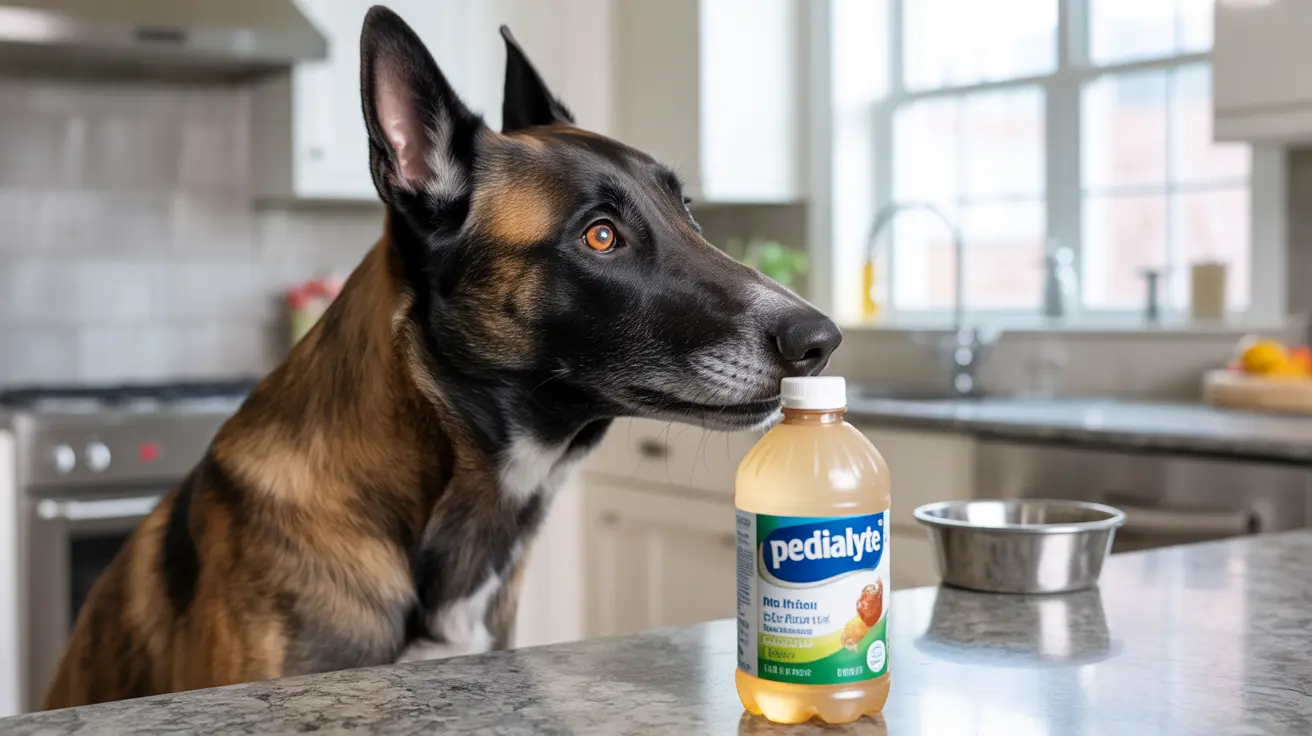When your dog is showing signs of dehydration, you might wonder about giving them Pedialyte, a common human electrolyte solution. While this over-the-counter remedy is effective for humans, its use in dogs requires careful consideration and veterinary guidance. Let's explore whether Pedialyte is truly good for dogs and what alternatives might be safer for your furry friend.
Understanding Pedialyte and Dogs
Pedialyte is an oral electrolyte solution containing sodium, potassium, and chloride, designed primarily for human use. While it can help restore electrolyte balance in people, dogs have different physiological needs and process electrolytes differently than humans do.
Dogs typically maintain their electrolyte balance through proper hydration with regular water, only requiring additional support during specific medical conditions or severe illness.
The Safety Profile of Pedialyte for Dogs
When considering Pedialyte for dogs, safety should be your primary concern. Only unflavored Pedialyte should ever be considered, as flavored versions often contain artificial sweeteners and additives that could be harmful to your pet.
Potential Risks and Concerns
Several risks are associated with giving Pedialyte to dogs:
- Electrolyte imbalances if given incorrectly
- Potential complications for dogs with existing health conditions
- Risk of worsening dehydration if improperly administered
- Possible adverse reactions to artificial ingredients in flavored versions
When Pedialyte Might Be Appropriate
There are limited situations where Pedialyte might be suitable for dogs, but only under specific conditions:
- Mild dehydration cases with veterinary approval
- Short-term use during recovery from minor gastrointestinal issues
- As part of a vet-supervised treatment plan
Professional Supervision Is Essential
Never administer Pedialyte without first consulting your veterinarian. They can assess whether it's appropriate for your dog's specific situation and provide proper dosing instructions.
Better Alternatives for Hydrating Dogs
Several safer alternatives exist for managing canine dehydration:
- Fresh, clean water (the best option for most cases)
- Veterinary-specific electrolyte solutions
- Ice chips for slow rehydration
- Professional IV fluid therapy for severe cases
When to Seek Emergency Care
Certain symptoms indicate that your dog needs immediate veterinary attention rather than home remedies:
- Severe lethargy or collapse
- Persistent vomiting or diarrhea
- Dry, tacky gums
- Sunken eyes
- Decreased skin elasticity
Frequently Asked Questions
Is Pedialyte safe for dogs to drink when they are dehydrated?
Pedialyte can be safe for dogs in limited circumstances, but only under veterinary supervision and using the unflavored version. Fresh water is typically a safer option for mild dehydration cases.
Can I give my dog flavored Pedialyte or do I need to use the unflavored version?
Only unflavored Pedialyte should ever be considered for dogs. Flavored versions contain artificial sweeteners and additives that could be harmful to your pet.
When should I consider giving Pedialyte to my dog, and should I consult a vet first?
Always consult your veterinarian before giving Pedialyte to your dog. It should only be considered for mild dehydration cases and under professional guidance.
What are the risks of giving Pedialyte to dogs with underlying health problems like diabetes or kidney disease?
Dogs with underlying health conditions face increased risks from Pedialyte use, including potential electrolyte imbalances, blood sugar fluctuations, and complications with kidney function. Professional veterinary guidance is essential in these cases.
Are there better alternatives to Pedialyte for rehydrating a dehydrated dog at home?
Yes, fresh water is usually the best option for mild dehydration. For more serious cases, veterinary-specific electrolyte solutions or professional medical treatment are preferred alternatives.
Conclusion
While Pedialyte might seem like a convenient solution for dehydrated dogs, it's not always the safest choice. The best approach is to consult with your veterinarian, who can recommend appropriate treatment based on your dog's specific needs. Remember, prevention through regular access to fresh water and prompt attention to illness symptoms is always better than treating dehydration after it occurs.






